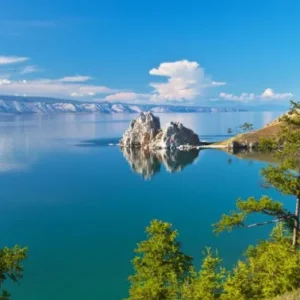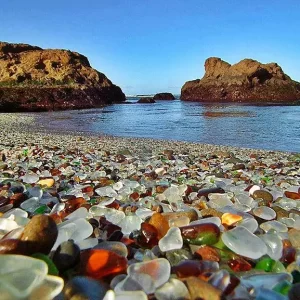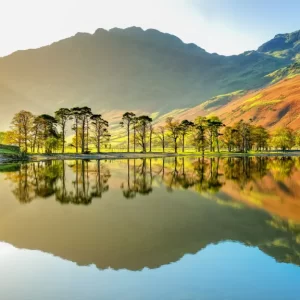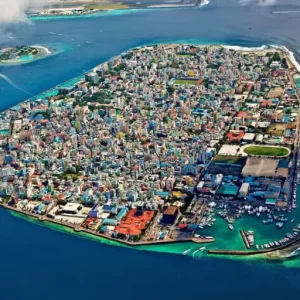With its remarkably preserved architecture dating back over a thousand years, Fenghuang Ancient Town mesmerizes visitors with its changing moods throughout the day — quiet and misty at dawn, magical as the sun rises, gentle during sunset, and bustling under a blanket of colorful lights by night.
Located in Hunan Province, China, Fenghuang (meaning “Phoenix”) is a top destination for travelers seeking history, scenery, and cultural depth. The town was built during the Ming and Qing Dynasties, and its charming layout reflects the elegance of ancient Chinese design.
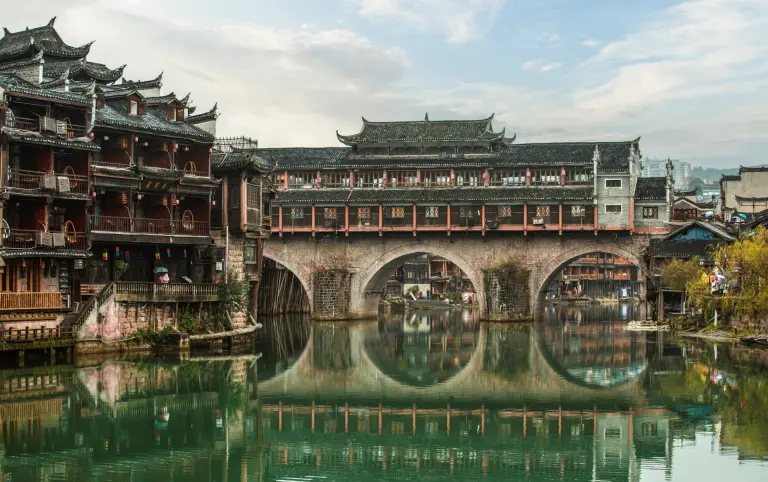
>> 10 most famous mountains in China – Where scenic beauty feels otherworldly
Legend has it that two phoenixes once flew over this land and, enchanted by its serene beauty, lingered here and refused to leave. Thus, the town was named Fenghuang in their honor.
Surrounded by lush mountains and mirrored in the emerald waters of the Tuojiang River, the town is best known for its “Diaojiaolou” stilt houses — timber structures perched on the riverside. Covered in moss and bathed in sunlight, they reflect like brushstrokes in a living landscape painting.
When to Visit?
The best time to explore this charming town is from July to November, when the weather is cool and dry — perfect for sightseeing and photography. However, if you prefer quiet over crowds, consider visiting in January or February, when tourism slows down, and you can enjoy the town’s peaceful charm.
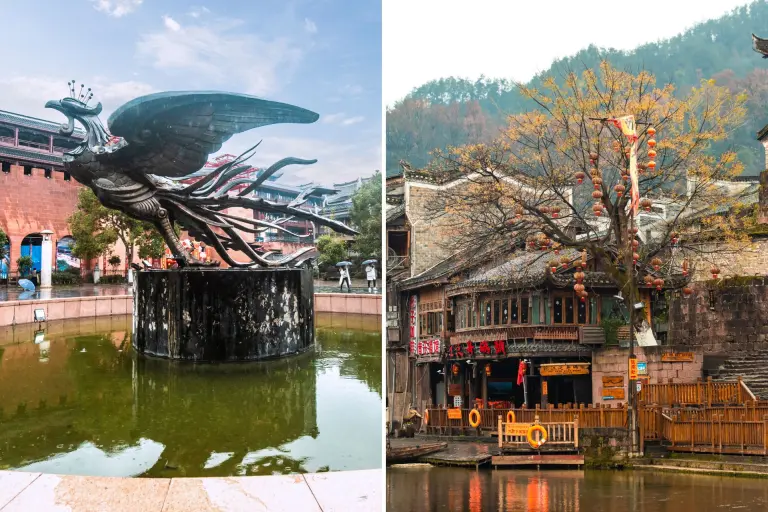
A Mosaic of Cultures
Fenghuang is home to various ethnic groups, including the Tujia, Miao, and Han. Each community contributes to the town’s rich cultural tapestry through unique customs, festivals, and traditional performances. Visitors can witness folk dances, rituals, and handicrafts, adding cultural depth to their journey.
During the day, the town feels like a tranquil retreat — ideal for wandering through cobbled alleys, enjoying a local coffee, or sampling traditional snacks. But when night falls, Fenghuang transforms into a vibrant wonderland of lanterns, music, and laughter, particularly along the riverfront bars and tea houses.
Don’t Miss the Local Cuisine
Fenghuang is a treat for food lovers. Grilled fish, smoked pork, and tofu dishes are must-tries. Be sure to sip on the famed Nu’er Hong wine and taste the region’s herbal teas. A quirky local custom is the “Waterfall Wine Toast”, a fun and unforgettable dining experience offered in many riverside restaurants.
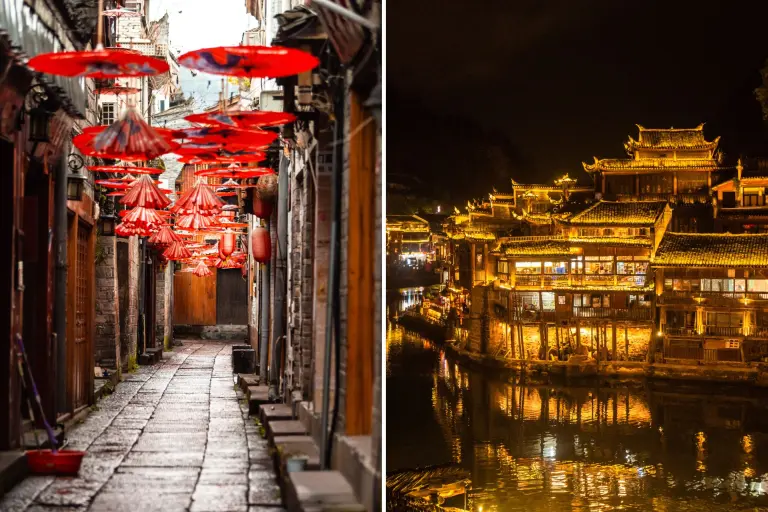
>> Conquering Hua Shan – The world’s most dangerous trail, Where challenge meets wonder
Cultural Performances Worth Seeing
If you truly want to immerse yourself in the spirit of the region, attend one of the town’s famous live shows:
- “Charming Western Hunan”
- “Zhangjiajie Eternal Love”
These breathtaking performances blend dance, music, folklore, and cutting-edge stage technology to depict the legends, love stories, and customs of the Tujia, Miao, and Han people.
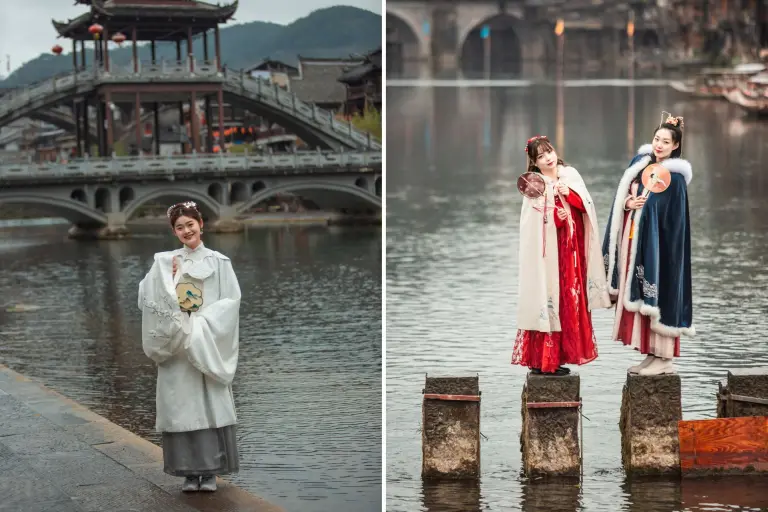
How to Get There?
From Vietnam, you can take a train to Lang Son, then continue by rail or bus into China. However, the most convenient way is to fly directly to Hunan. Once you land, enjoy a relaxing local meal and get ready to explore Fenghuang the next day.
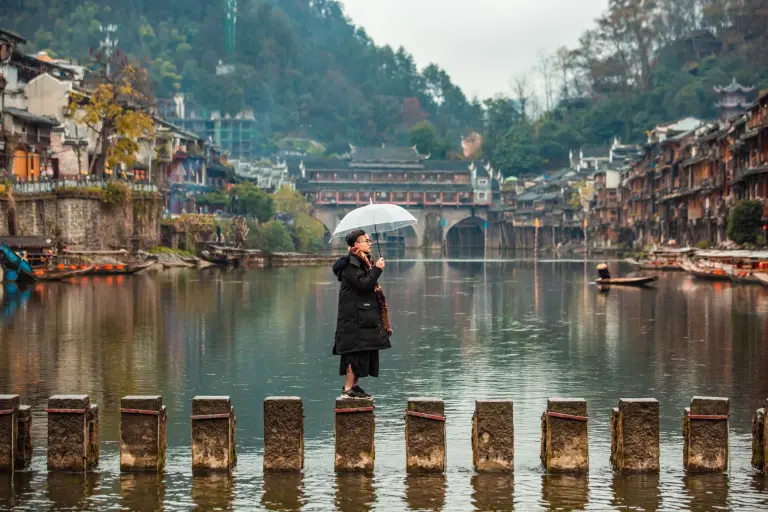
>> An Abandoned Village Becomes a Tourism Sensation with Enchanting Treehouses in China
A Region Full of Mystique
Many nearby attractions lie within Western Hunan, an area famous for bizarre traditions such as corpse-herding rituals, poison cults, and wedding wailing customs. Despite the eccentricity, the cultural and historical value is enormous.
What’s truly impressive is how Fenghuang has maintained its charm even under the weight of tourism. Every alley and riverside path is clean, and the preservation of traditional architecture is commendable.
While crowds grow yearly, the town’s soul remains untouched. You can still hear the rhythmic sound of ethnic Tujia and Miao women washing clothes by the river, or catch the soothing notes of a musician letting their song float on the breeze.
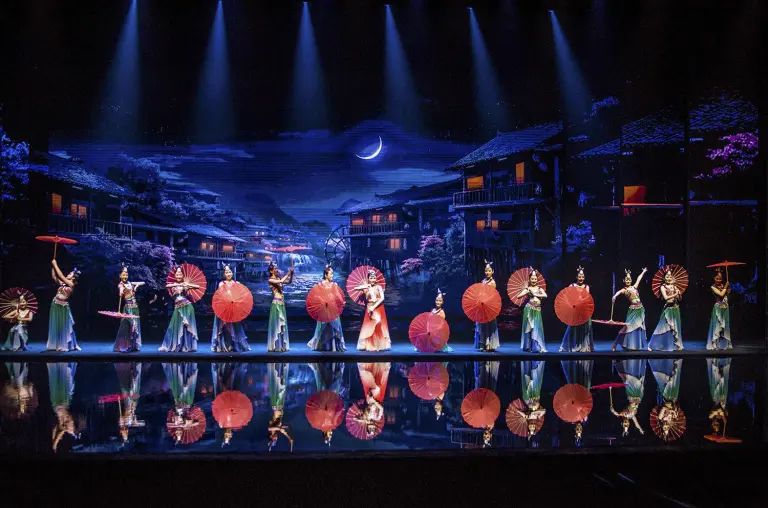
>>
FAQ
What is Fenghuang Ancient Town?
Fenghuang Ancient Town (凤凰古城), meaning “Phoenix Ancient Town,” is a beautifully preserved historic town located in Hunan Province, China. With a history spanning over 1,300 years, it is often referred to as one of China’s most picturesque old towns — known for its Miao ethnic culture, traditional stilt houses, mist-covered rivers, and cobblestone lanes.
Why is it called “Fenghuang” (Phoenix)?
According to local legend, two phoenixes flew over the town and were so enchanted by its beauty that they chose to stay. The town was then named “Fenghuang,” symbolizing rebirth, harmony, and eternal grace — themes that echo through its poetic streets and tranquil riverside scenes.
Where is Fenghuang located?
Fenghuang Ancient Town is nestled along the Tuojiang River, surrounded by green mountains in western Hunan Province, close to the border of Guizhou. Though remote, it’s reachable by bus, train, or a short flight from nearby cities like Zhangjiajie or Changsha.
What makes Fenghuang so special?
It’s the combination of natural beauty, deep-rooted history, and vibrant ethnic culture. Visitors are mesmerized by the:
- Traditional wooden stilt houses perched along the riverbank
- Narrow alleyways filled with red lanterns and ancient stone bridges
- Presence of the Miao and Tujia minorities, who continue to wear traditional dress and maintain ancestral customs
- Reflections of glowing lights dancing on the calm river each night
Every turn in Fenghuang feels like stepping into a timeless Chinese watercolor painting.
What can visitors do in Fenghuang Ancient Town?
There’s plenty to explore:
- Wander the ancient streets and admire Ming and Qing dynasty architecture
- Take a boat ride along the Tuojiang River for the best views of the stilt houses
- Visit Shen Congwen’s Former Residence, the home of one of China’s literary giants
- Discover the Hong Bridge, an iconic covered bridge combining beauty and practicality
- Enjoy local Miao-style delicacies, silver jewelry shopping, and traditional performances
At night, the town transforms with glowing red lanterns and live music echoing along the water.
When is the best time to visit Fenghuang?
The best times to visit are during spring (March–May) and autumn (September–November) when the weather is pleasant, and crowds are manageable. Early mornings are particularly magical — when mist floats above the river and the town feels peacefully frozen in time.
Avoid major Chinese holidays (like Golden Week or Chinese New Year) if you prefer a quieter, more authentic experience.
Do people still live in the ancient town?
Yes, many locals still live within the old town, especially members of the Miao ethnic minority. You’ll see grandmothers weaving embroidery, elders smoking bamboo pipes, and children playing by the riverside. It’s not just a tourist attraction — it’s a living, breathing community.
Is Fenghuang touristy?
In recent years, Fenghuang has grown in popularity, especially with domestic Chinese travelers. While parts of the town do cater to tourism (souvenir shops, cafes, etc.), the town has managed to preserve its historic charm, especially in the early mornings or by exploring quieter alleys away from the main strip.
What kind of food is Fenghuang known for?
Fenghuang offers a taste of Miao and Hunan cuisine, which tends to be flavorful, spicy, and rich in local ingredients. Dishes to try include:
- Blood tofu
- Smoked pork with pickled vegetables
- Sticky rice cakes wrapped in bamboo leaves
- River fish grilled with local spices
There are also many charming riverside teahouses where you can sip jasmine tea and watch life go by.
Can I stay overnight in the ancient town?
Absolutely — and it’s highly recommended. There are many guesthouses, homestays, and boutique inns within the old town, some of which are converted stilt houses with river views. Waking up to morning mist drifting across the water is an unforgettable experience.
How do I get to Fenghuang?
There’s no direct airport in Fenghuang, but you can:
- Fly into Zhangjiajie or Huaihua, then take a bus (3–4 hours)
- Take a high-speed train to Jishou Station, followed by a short bus or taxi ride
- Or opt for organized tours that include Fenghuang in multi-day itineraries
Despite the remoteness, the journey is well worth it.
Is Fenghuang worth visiting?
Without a doubt. Fenghuang is a rare gem — a place where ancient architecture, folklore, and natural serenity blend in perfect harmony. It’s ideal for travelers who love history, photography, slow travel, or cultural immersion.
Unlike fast-paced cities, Fenghuang invites you to slow down, breathe, and reflect — just like the phoenixes that chose to rest there centuries ago.
>> Xiaozhai Tiankeng – the world’s deepest sinkhole!
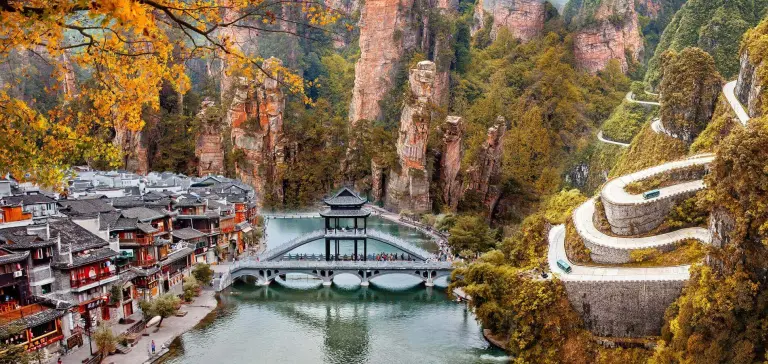
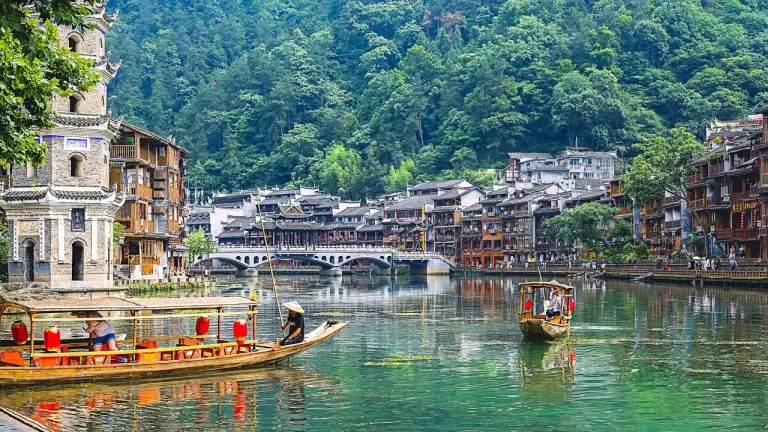
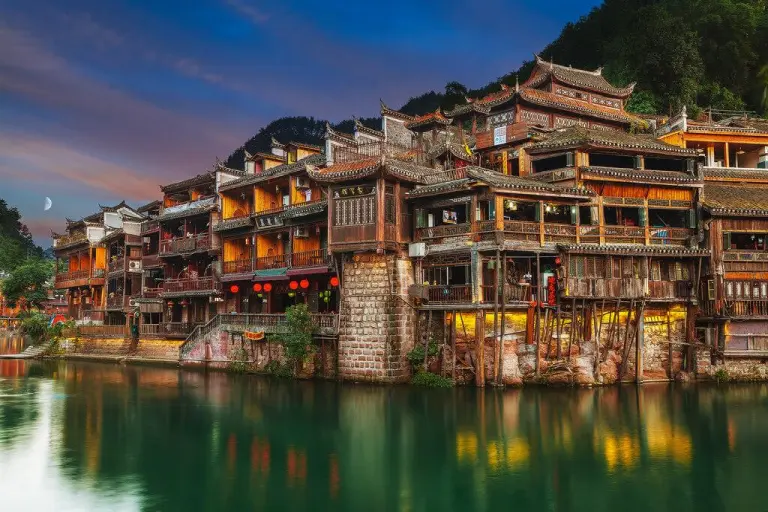
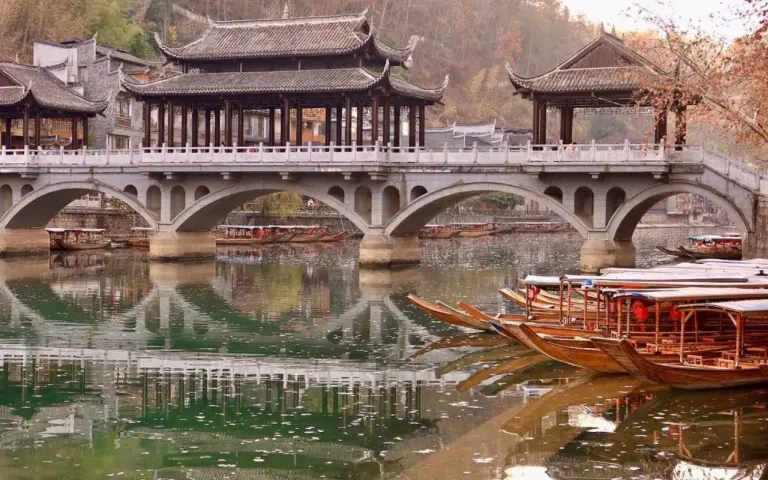
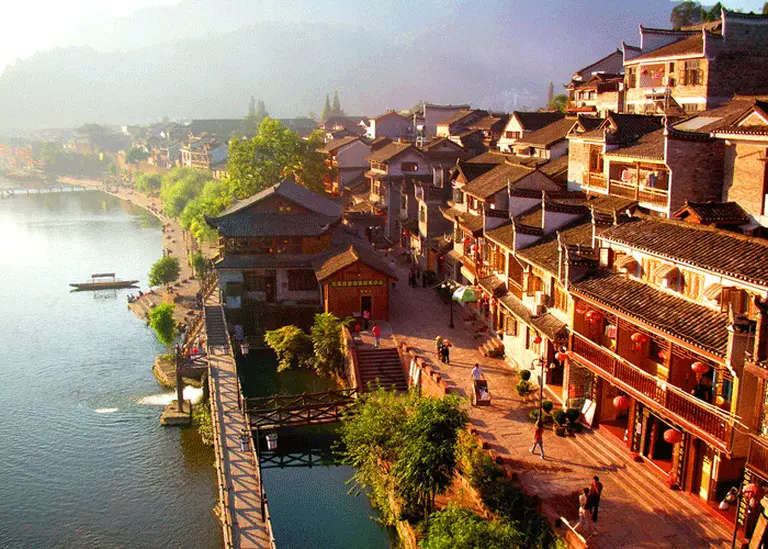
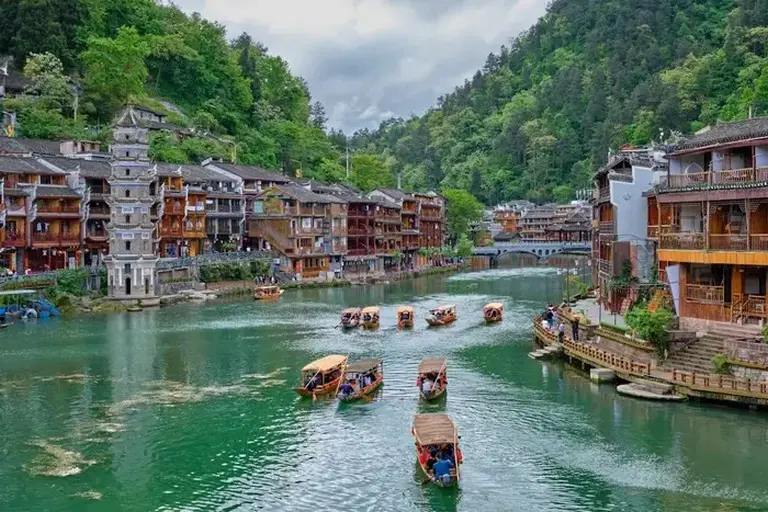
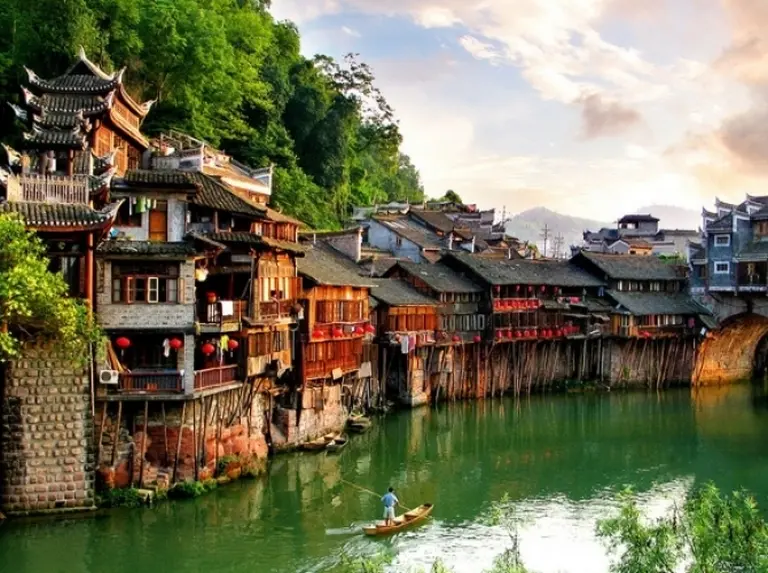
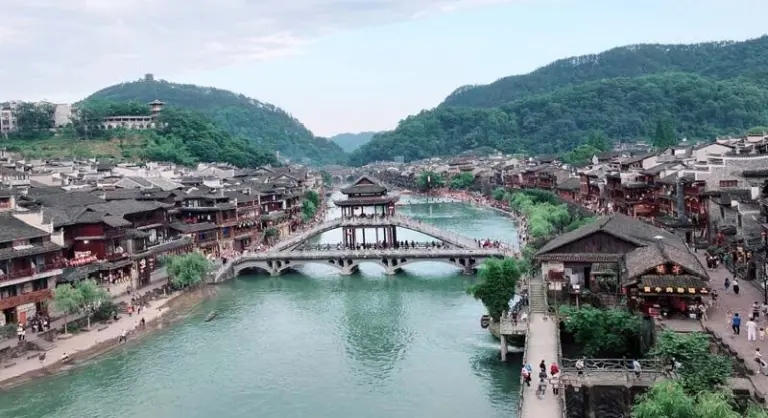
Fenghuang Ancient Town isn’t just a destination — it’s an experience suspended in time. A perfect blend of nature, culture, and history, it invites you to slow down, breathe in the mountain air, and immerse yourself in a poetic world that feels both eternal and fleeting.
Follow our blog for more hidden gems like this, and let the journey to timeless places begin.


